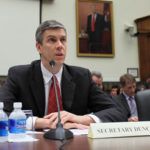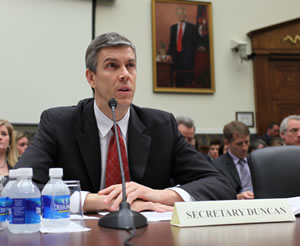
The U.S. Education Department (ED) will take longer than expected to formulate new regulations for for-profit colleges, and private-sector school officials expect about 1,000 students to speak out against the government’s measures at a rally planned for Sept. 29 in Washington, D.C.
For-profit colleges have campaigned hard against the “gainful employment” rule, which would cut off federal aid to college vocational programs with high student debt levels and poor loan repayment rates. They’ve lobbied Congress, purchased newspaper ads, and helped students and others register complaints with ED.
The government was to publish its final rules by Nov. 1, but ED officials announced a new timeline on Sept. 24, saying sections of the plan would be ready by Nov. 1 and the remaining portions will be published in early 2011.
ED’s delay on the new regulations comes just two weeks after a report that showed for-profit lobbying has skyrocketed since Education Secretary Arne Duncan first criticized some industry colleges of unseemly practices that required tougher government oversight, as first reported Sept. 17 by the journalistic nonprofit group ProPublica.
Members of Congress who signed three letters expressing “serious concern” with Duncan’s proposals received more than $90,000 from the for-profit industry during the first seven months of 2010, according to online campaign contribution records.
Students from for-profit colleges and universities will join officials from those schools this week to protest ED’s regulations during a rally at the U.S. Capitol, organized by the Association of Private Sector Colleges and Universities (APSCU).
“Many are concerned about the current negative environment in Washington regarding private-sector colleges and universities and want to show their support for the education that they’ve received and how it will contribute to their long-term career success,” APSCU said in a statement. “They oppose policies that limit choice and diminish the value of their postsecondary educations.”
Rally attendees will include APSCU President Harris Miller and Arthur Keiser, chancellor of Keiser University, a family-owned chain of 13 campuses across Florida.
Legislators who signed the letters received contributions from political action committees representing DeVry Inc., the Career Education Corporation, the Career College Association, and Corinthian Colleges Inc., among other for-profit education companies, according to public records.
Keiser from Keiser University also is listed as a main contributor to signers of the letters to Duncan.
ED said it was taking more time to consider comments—it received about 91,000 during a 90-day comment period, a record for a proposed higher-education regulation—and hold several meetings and public hearings in the coming weeks. The department said the schedule allows it to stick to its plan for the rules to go into effect around July 1, 2012.
“Let me be clear: We’re moving forward on gainful employment regulations,” Duncan said in a statement. “While a majority of career colleges play a vital role in training our workforce to be globally competitive, some bad actors are saddling students with debt they cannot afford in exchange for degrees and certificates they cannot use.”
Duncan said additional feedback would help the department strike “the right balance” between holding the programs accountable to protect students and taxpayers and “making sure we keep whole those programs that are doing a good job.”
Shares of for-profit education companies, beaten down earlier this year, had moved higher in the past few weeks. Rumors of a delay in the gainful employment rule’s publication had raised investor hopes that the government was considering a softer approach, said Sterne Agee analyst Arvind Bhatia.
Those investors were disappointed by ED’s Sept. 24 statement, he said. Shares mostly turned lower or trimmed their gains after the announcement.
For-profit education companies have argued the rule would disproportionately hurt low-income and minority students and undermine the Obama administration’s college completion goals. The industry also has questioned the methodology behind the rule.
Student and consumer advocacy groups counter that the proposal is too weak, saying programs could continue to profit from federal aid when more than half their students can’t afford to pay down the principal on their loans.
The rule would help, not hurt, consumers if it forces career colleges to reduce tuition and improve their programs, they say.
The impact of the proposed rule is in dispute. ED estimates that if schools make no changes, 5 percent of for-profit college programs would be ineligible for federal aid in 2012—affecting 8 percent of all for-profit college students. For-profit colleges say that underestimates the impact.
For-profit college industry leaders are fighting proposed regulations after a federal government report revealed dishonest tactics in some of the most popular private-sector schools.
Investigators from the Government Accountability Office (GAO) posed as college students and found that four out of 15 institutions they examined “encouraged fraudulent practices” to secure federal student loans, and representatives from all 15 colleges “made deceptive or otherwise questionable statements” to the undercover students, according to a report published in August on the GAO’s web site.
The extensive report is the latest in a string of negative publicity for for-profit schools, which include industry giants such as the University of Phoenix, Kaplan University, and DeVry University.
Four of the GAO investigators who went undercover and applied to for-profit schools were encouraged by college personnel “to falsify their financial aid forms to qualify for federal aid,” according to the report. In one case, a college recruiter encouraged the undercover applicant to hide $250,000 in savings so he would be eligible for federal student aid.
In an undercover video posted alongside the GAO report, a recruiter in Texas tells a pretend applicant that the government doesn’t “need to know how much cash you have” after the applicant said he received a $250,000 inheritance from a deceased aunt.
- Research: Social media has negative impact on academic performance - April 2, 2020
- Number 1: Social media has negative impact on academic performance - December 31, 2014
- 6 reasons campus networks must change - September 30, 2014


Comments are closed.